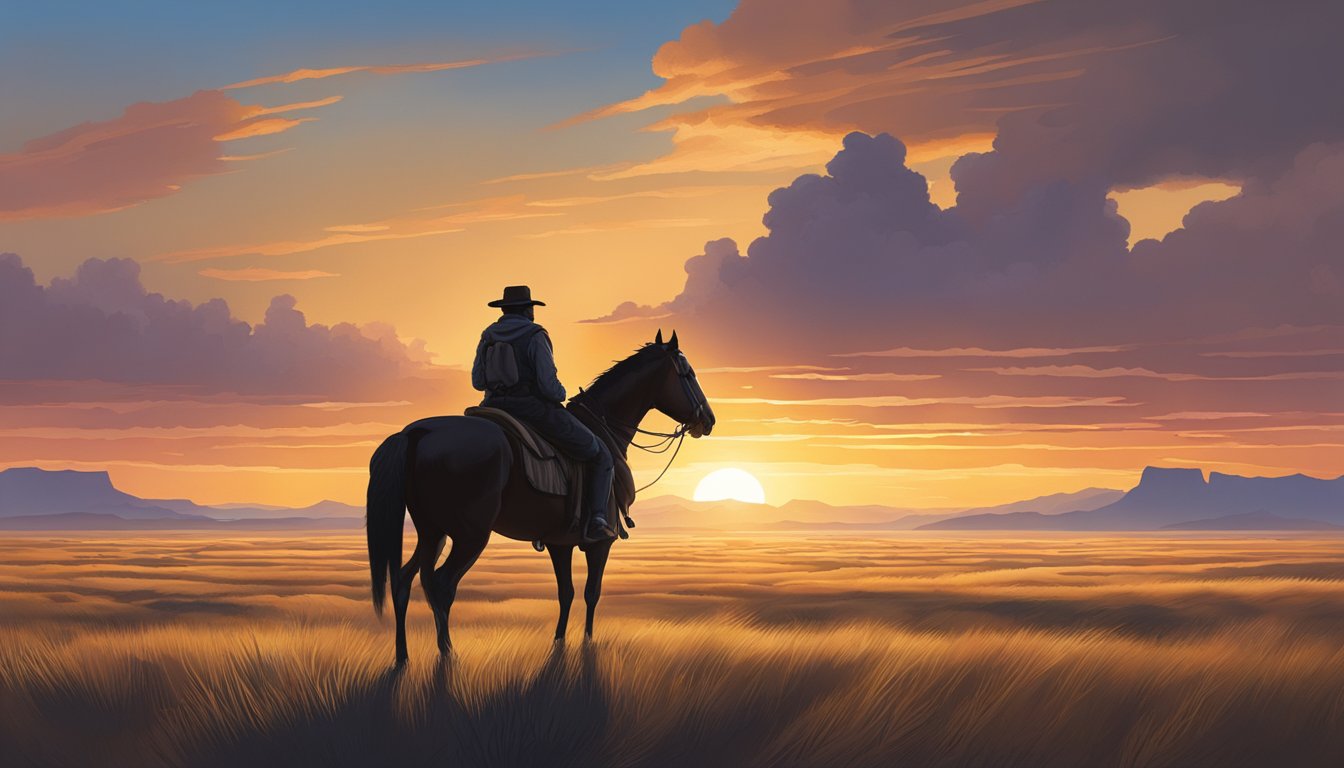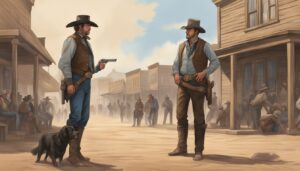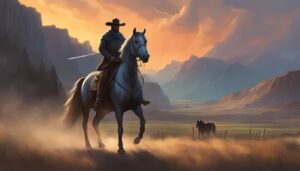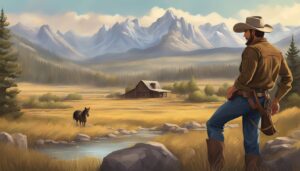Western dramas have captivated audiences for generations, with iconic characters leaving lasting impressions. Two such figures stand out: John Dutton from Yellowstone and Woodrow Call from Lonesome Dove. Both embody the rugged spirit of the American West, but in distinctly different ways.
John Dutton, portrayed by Kevin Costner, is the patriarch of the Dutton family and owner of the largest contiguous ranch in the United States. His character represents the modern cowboy, facing contemporary challenges while adhering to traditional values. Woodrow Call, played by Tommy Lee Jones in the Lonesome Dove miniseries, is a former Texas Ranger turned cattle driver in the post-Civil War era. While both characters display remarkable strength and determination, Woodrow Call’s unwavering sense of duty and his journey across the untamed frontier arguably make him the more impressive Western hero.
These characters have become benchmarks for Western protagonists, each resonating with viewers for their complexity and depth. Their stories, set in different time periods, offer unique perspectives on the evolving nature of the American West and the enduring spirit of those who shaped it.
Character Overview

John Dutton and Woodrow Call stand as iconic figures in Western television dramas. Their personalities, motivations, and leadership styles have captivated audiences and shaped their respective series.
John Dutton’s Profile
John Dutton, portrayed by Kevin Costner in Yellowstone, is the patriarch of the Dutton family. He owns the largest contiguous ranch in the United States, located in Montana.
John is fiercely protective of his land and legacy. His determination to preserve his family’s heritage often leads to morally ambiguous decisions.
As a leader, John is pragmatic and cunning. He navigates complex political and business landscapes with a mix of charm and ruthlessness.
John’s relationship with his children is complicated. He struggles to balance his role as a father with his responsibilities as a rancher and businessman.
Woodrow Call’s Profile
Woodrow Call, a central character in Lonesome Dove, is a former Texas Ranger turned cattle driver. He embodies the classic Western hero archetype.
Call is known for his stoic demeanor and unwavering sense of duty. His commitment to justice and order often comes at the expense of personal relationships.
As a leader, Call is respected for his competence and bravery. He commands loyalty through his actions rather than words.
Call’s emotional detachment is a defining trait. This characteristic impacts his interactions with partners, friends, and even his own son.
His journey from Texas to Montana showcases his adaptability and resilience in the face of harsh frontier conditions.
Themes and Motivations

John Dutton and Woodrow Call are driven by distinct forces that shape their actions and decisions. Their motivations reflect deeper themes of legacy, order, and duty in the American West.
Dutton’s Fight for Legacy
John Dutton’s primary motivation is preserving his family’s legacy and the Dutton Ranch in Montana. He views the ranch as more than just land – it’s a symbol of his family’s history and future. Dutton faces constant threats from developers, Native American tribes, and government officials who want to claim parts of his vast property.
His fight often leads to conflict and even violence. Dutton is willing to use any means necessary to protect what he sees as rightfully his. Despite his harsh methods, he shows moments of compassion, especially toward his children and grandchildren.
The Yellowstone patriarch sees himself as a guardian of a way of life that is rapidly disappearing in modern America. This struggle between tradition and progress is a central theme in Dutton’s story.
Call’s Quest for Order
Woodrow Call from Lonesome Dove is driven by a strong sense of duty and a desire to bring order to the frontier. As a former Texas Ranger, Call believes in upholding the law and maintaining discipline in a chaotic land.
His quest often puts him at odds with the lawlessness of the Old West. Call’s strict moral code and unwavering loyalty to his principles guide his actions throughout his journey.
Unlike Dutton, Call isn’t fighting to preserve a family legacy. Instead, he seeks to establish a legacy of his own through his actions and reputation. His dedication to his work and his companions reflects themes of honor and sacrifice common in Western narratives.
Call’s character embodies the classic Western hero archetype, facing the harsh realities of frontier life with stoic determination. His journey highlights the personal cost of maintaining order in a wild and unforgiving land.
Supporting Characters and Relationships

The supporting characters in “Yellowstone” and “Lonesome Dove” play crucial roles in shaping the protagonists and driving the plot forward. Family dynamics, alliances, and rivalries create intricate webs of relationships that test loyalties and influence key decisions.
Yellowstone’s Dutton Family Dynamics
Beth Dutton stands out as a fierce and complex character. Her sharp wit and business acumen make her a formidable ally to her father John. Kayce Dutton, the youngest son, struggles to balance his loyalty to the family with his own desires. Jamie Dutton‘s relationship with John is often strained, leading to conflicts within the family.
Rip Wheeler, though not a Dutton by blood, plays a vital role as John’s right-hand man and Beth’s love interest. His unwavering loyalty to the family adds depth to the ranch’s operations.
The Dutton family business creates tension as questions of succession arise. Each child vies for their position within the ranch hierarchy, leading to power struggles and shifting allegiances.
Allies and Rivals in Lonesome Dove
Woodrow Call’s partnership with Augustus McCrae forms the backbone of “Lonesome Dove”. Their contrasting personalities – Call’s stoic determination and McCrae’s jovial nature – create a dynamic relationship that drives the story forward.
The Hat Creek Cattle Company crew, including Pea Eye Parker and Newt Dobbs, provide loyal support to Call throughout their journey. These characters offer different perspectives on Call’s leadership and decision-making.
Clara Allen, Call’s former love interest, challenges his rigid worldview and forces him to confront past decisions. Her presence adds emotional depth to Call’s character arc.
Jake Spoon, a former Texas Ranger, serves as both ally and antagonist. His actions test the limits of Call’s loyalty and justice, creating moral dilemmas for the protagonist.
Cultural and Social Influence

Yellowstone and Lonesome Dove have left indelible marks on popular culture, shaping perceptions of the American West. Both narratives explore themes of family, legacy, and the changing frontier landscape.
Representation of the American West in Yellowstone
Yellowstone portrays a modern vision of the American West, blending traditional cowboy culture with contemporary issues. The Dutton Ranch symbolizes a vanishing way of life, threatened by progress and outside interests.
The show highlights conflicts between ranchers, developers, and Native Americans. Chief Thomas Rainwater of the Broken Rock Indian Reservation represents Indigenous perspectives, adding depth to the cultural narrative.
Yellowstone’s popularity has sparked renewed interest in Western fashion and lifestyle. Cowboy hats, boots, and ranch-inspired clothing have seen a resurgence in mainstream fashion.
The series has boosted tourism in Montana, with fans eager to experience the rugged landscapes featured in the show.
Historical Impact of Lonesome Dove
Lonesome Dove revitalized the Western genre in the late 1980s, captivating audiences with its epic tale of a cattle drive. The miniseries brought the American frontier to life, showcasing the harsh realities and romantic ideals of the Old West.
Woodrow Call’s character embodied the stoic, principled cowboy archetype, reinforcing traditional values associated with the Western hero. The story’s exploration of friendship, duty, and the settling of the frontier resonated deeply with viewers.
Lonesome Dove’s success sparked a renewed interest in Western literature and history. It inspired numerous adaptations and spin-offs, cementing its place in American cultural canon.
The series influenced subsequent Western productions, setting a high standard for authenticity and character development in the genre.
Production and Development

The production and development of “Yellowstone” and “Lonesome Dove” showcase the meticulous craftsmanship behind these Western epics. Both series required extensive planning, location scouting, and character development to bring their respective visions to life.
Yellowstone: Behind the Scenes
Taylor Sheridan’s neo-Western drama “Yellowstone” utilizes Montana’s breathtaking landscapes as its primary filming location. The production team faced challenges working in harsh weather conditions, requiring quick adaptations from cast and crew. Kevin Costner’s portrayal of John Dutton anchors the series, with his character development central to the show’s success.
Christina Voros, a key director, brings a unique visual style to “Yellowstone.” The series blends stunning visuals with complex character arcs, creating a modern Western that resonates with audiences.
Paramount+ has become the show’s streaming home, expanding its reach to viewers worldwide.
Lonesome Dove’s Creative Process
“Lonesome Dove” emerged from Larry McMurtry’s Pulitzer Prize-winning novel. The miniseries adaptation required careful character translation from page to screen. Woodrow Call, portrayed by Tommy Lee Jones, underwent significant development to capture the essence of McMurtry’s creation.
The production team scouted authentic Western locations to bring the 19th-century cattle drive to life. Period-accurate costumes and set designs enhanced the show’s immersive quality.
Director Simon Wincer worked closely with the cast to ensure faithful character portrayals. The series’ success led to several follow-up productions, expanding the “Lonesome Dove” universe.
Reception and Legacy

Both “Yellowstone” and “Lonesome Dove” have left significant marks on the Western genre, captivating audiences and critics alike. Their protagonists, John Dutton and Woodrow Call, have become iconic figures in television history.
Critical Acclaim for Yellowstone
“Yellowstone” has garnered widespread praise for its compelling storytelling and strong performances. The show’s popularity has surged since its 2018 debut on Paramount Network. Kevin Costner’s portrayal of John Dutton has been particularly lauded, earning him a Golden Globe for Best Actor in a Drama Series.
Critics have praised the show’s exploration of modern Western themes and complex family dynamics. “Yellowstone” has consistently high ratings, with Season 5 breaking viewership records for the Paramount Network.
The series has spawned a dedicated fan base, inspiring merchandise, fan theories, and social media discussions. Its success has led to multiple spin-off series, expanding the “Yellowstone” universe.
Lasting Impact of Lonesome Dove
“Lonesome Dove” continues to be revered as a landmark in television miniseries history. The 1989 adaptation of Larry McMurtry’s novel received critical acclaim and numerous awards, including seven Emmy Awards.
Tommy Lee Jones’ portrayal of Woodrow Call was widely praised for its depth and authenticity. The character has become a benchmark for Western protagonists, embodying the stoic and determined spirit of the frontier.
The miniseries’ success reignited interest in Western dramas, influencing subsequent productions in the genre. “Lonesome Dove” remains a cultural touchstone, frequently cited as one of the greatest Western productions in television history.
Its enduring popularity has led to literary sequels and television follow-ups, cementing its place in the Western canon.
Conclusion

John Dutton and Woodrow Call stand as towering figures in the Western genre. Both characters embody the rugged individualism and grit associated with the American frontier.
Dutton’s modern-day struggles to preserve his family’s legacy resonate with contemporary audiences. His complex moral code and adaptability to changing times make him a compelling protagonist.
Call’s unwavering determination and loyalty to his principles harken back to classic Western heroes. His journey across the untamed West captures the essence of manifest destiny and pioneer spirit.
While Dutton faces corporate threats and political maneuvering, Call contends with harsh landscapes and lawless territories. Each character’s challenges reflect their respective eras in American history.
Ultimately, both John Dutton and Woodrow Call leave lasting impressions as iconic Western heroes. Their stories continue to captivate viewers and readers, cementing their places in the pantheon of memorable fictional cowboys.



